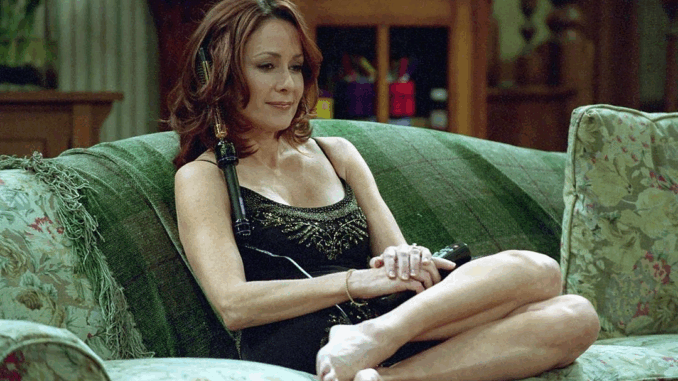
The Casting Battle No One Knew About
You probably remember Debra Barone as the loving, sarcastic, sometimes exasperated wife on Everybody Loves Raymond. Played perfectly by Patricia Heaton, Debra quickly became a fan favorite—relatable, funny, and the true heart of the show’s family chaos.
But here’s the kicker: CBS executives reportedly wanted someone “hotter” for the role. That’s right—the network wasn’t convinced Patricia Heaton fit their mold for Debra.
Creator Philip Rosenthal Breaks the Silence
Philip Rosenthal, the creative genius behind the hit sitcom, recently opened up about the network’s casting skepticism. According to him, CBS was pushing for a Debra who was more conventionally attractive, a version that didn’t quite match the grounded, realistic woman he envisioned.
Rosenthal said,
“They wanted someone hotter. But that wasn’t the point. Debra needed to be real—relatable, funny, and imperfect.”
Why Did CBS Want a ‘Hotter’ Debra?
It’s a classic TV network move—producers often feel pressure to put the most glamorous, eye-catching actors front and center, especially in roles designed to be the romantic lead.
CBS executives probably thought a more traditionally “hot” actress would draw viewers or fit better into the glossy TV landscape of the early 2000s.
But what they underestimated was the power of authenticity. Debra wasn’t supposed to be a supermodel. She was the everyday wife, dealing with everyday family drama.
Patricia Heaton’s Impact: Realness Over Glamour
Patricia Heaton’s portrayal proved the network wrong in the best way possible. Her ability to bring depth, humor, and a no-nonsense attitude to Debra helped Everybody Loves Raymond soar in popularity.
Fans loved that Debra felt like someone they knew—a real woman juggling the madness of family life without any Hollywood gloss.
Rosenthal’s casting choice proved that sometimes being real beats being pretty—especially in comedy.
How Casting Choices Shape TV Shows
This story isn’t unique to Everybody Loves Raymond. Network executives often prioritize looks over substance, especially for female roles. But some of TV’s most beloved characters have been those that defied these superficial expectations.
Debra Barone stands tall alongside other iconic characters who remind us that personality and nuance win the day.
Behind Every Great Woman Is a Creator Who Believes
Philip Rosenthal’s willingness to fight for Patricia Heaton’s casting shows the importance of creative vision. Without that fight, the show might have lost the heart that made it unforgettable.
Sometimes, it’s the uncomfortable conversations and the tough decisions behind the scenes that define a show’s legacy.
How Fans Reacted When They Learned the Truth
When fans found out about CBS’s initial doubts, many expressed support for Heaton, calling her “perfect” for the role. Social media lit up with comments like:
-
“Debra wouldn’t be Debra without Patricia’s realness.”
-
“Thank God the creator fought for her!”
-
“This just shows how Hollywood misses the point sometimes.”
A Casting Lesson for Modern TV
In today’s world, where diversity and authenticity are finally being embraced, this story stands as a reminder: the best characters don’t come from fitting a narrow mold—they come from embracing uniqueness.
Patricia Heaton’s Debra will forever be proof of that.
Conclusion: Real Talent Wins Every Time
CBS wanted a “hotter” Debra, but the show got Debra—smart, funny, grounded, and endlessly relatable. Thanks to Philip Rosenthal’s vision and Patricia Heaton’s talent, Debra Barone became a TV icon for real people everywhere.
It’s a casting tale with a clear moral: authenticity beats superficiality every single time.
FAQs
1. Why did CBS want a “hotter” Debra for the show?
CBS believed a more glamorous actress would attract viewers and fit the network’s image, but the creator wanted realism.
2. Did Patricia Heaton almost lose the role?
There was network resistance, but creator Philip Rosenthal stood firm, ensuring Heaton got the part.
3. How did Patricia Heaton’s casting impact the show?
Her authentic performance made Debra relatable and helped the show connect deeply with its audience.
4. Was this kind of casting pressure common at the time?
Yes, networks often prioritized physical appeal, especially for female leads in sitcoms.
5. What can we learn from this casting story?
It highlights the importance of authenticity and trusting creative vision over superficial trends.
